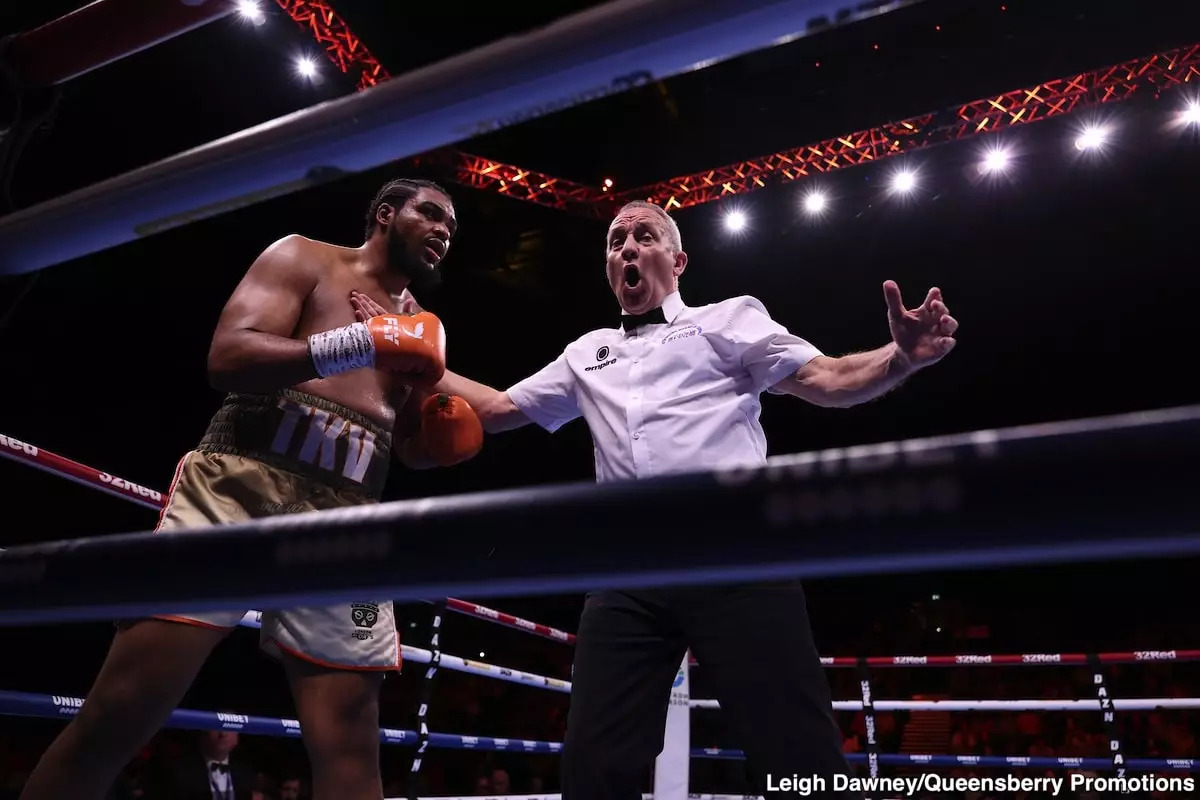In the exhilarating yet unpredictable world of heavyweight boxing, disagreements and chaos often reign supreme, yet nothing could prepare fans for the shocking events that unfolded during the recent matchup in Manchester. As Filip Hrgovic triumphed over Joe Joyce in the main event, it was the third fight featuring David Adeleye and Jeamie TKV that stirred the pot, igniting passionate debates and leaving viewers questioning the integrity of the officiating. This bout, which was subdued until a cataclysmic sixth round, saw an ending that can only be described as baffling and infuriating.
The crux of the conflict arose during a seemingly routine moment—one that should have served as a neutral reset in the fight. Instead, it spiraled into confusion and frustration that has echoed through the boxing community. In a pivotal moment, the referee, Ron Kearney, called for a break in the action, only for Adeleye to unleash a powerful left hook that connected squarely with TKV’s chin while he was still in motion. This moment not only altered the trajectory of the match but raised crucial questions about adherence to the rules and the responsibilities of those officiating the bout.
The Gripping Moments Captured on Replay
Analyzing the replays reveals a nuanced reality. Kearney’s repeated calls for separation were apparent, as was his directive that TKV break off from the clinch. The split-second chaos that followed casts a dark shadow on what should have been a clean break in the action. Was the referee culpable for failing to exert authority in a moment when clear communication was paramount? As TKV fell to the canvas, it became clear that he was not just suffering from a tactical setback; he was significantly compromised.
Ben Shalom, TKV’s promoter, did not mince words in his condemnation of the officiating, branding the episode one of the most disgraceful moments of his career. His frustrations encapsulate the sentiments of many: when the rules are not upheld and critical moments are mishandled, the sport suffers, alongside the athletes who dedicate their lives to it. Shalom’s arguments force a critical examination of accountability in the boxing profession, particularly as it pertains to refereeing decisions that can irrevocably alter outcomes.
Implications for Both Fighters and Future Fights
The swirling narratives around this fight extend beyond mere disappointment at a mismanaged situation. There are long-term implications for both fighters involved. TKV, who was seemingly winning the fight until that fateful moment, deserves recognition for his efforts, yet he now faces the aftermath of a controversial decision that could haunt his career trajectory. The immediate pain of unjust defeat is compounded by the uncertainty that exists regarding a potential rematch against Adeleye.
Would boxing fans genuinely desire to witness a repeat of a bout marred by such a scandal? While rematches can generate anticipation and excitement, the specter of unfairness lingers when the original bout’s outcome is rooted in miscommunication and referee errors. Although TKV undoubtedly deserves an opportunity for rectification, there’s a palpable discomfort with the prospect of repeating history—especially when the combatants face the danger of a similar controversial ending.
The Need for Reform in Officiating
While boxing is celebrated for its raw brilliance and thrilling moments, incidents such as this echo deeper, highlighting an urgent need for reform in officiating standards. The balance of justice in the ring must be meticulously curated to ensure that fighters’ efforts are accurately reflected in the outcomes. This situation exemplifies how even a single misjudgment can irrevocably alter careers, lead to dissatisfaction among fans and promoters alike, and erode trust in the established systems meant to uphold fairness in the sport.
As the British Boxing Board of Control prepares to respond to the fallout from this match, it has an invaluable opportunity to serve not just justice for TKV but improve the sport as a whole. Fans, promoters, and fighters deserve clarity and integrity in every bout, and only through confronting uncomfortable truths can the boxing community learn and, ideally, progress.

